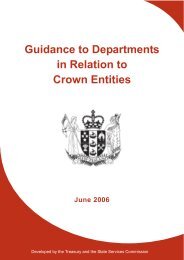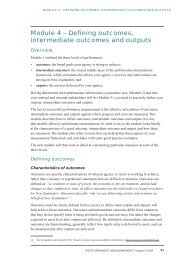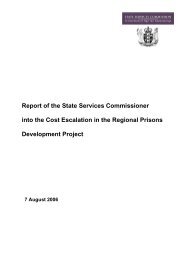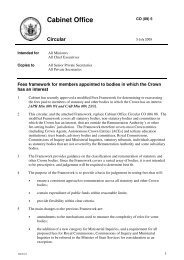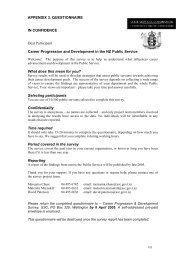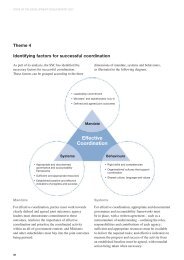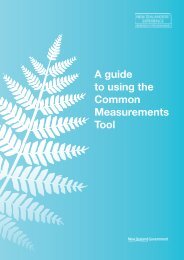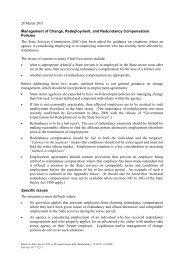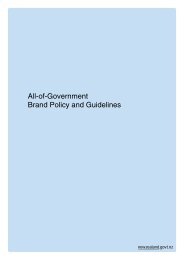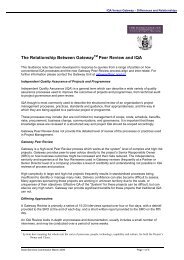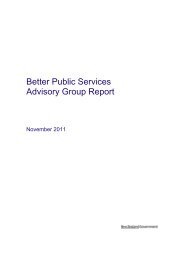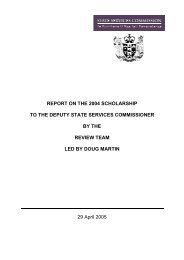Implementing the Code of Conduct - State Services Commission
Implementing the Code of Conduct - State Services Commission
Implementing the Code of Conduct - State Services Commission
Create successful ePaper yourself
Turn your PDF publications into a flip-book with our unique Google optimized e-Paper software.
The <strong>State</strong> <strong>Services</strong> <strong>Commission</strong>er’s role as leader on integrity and conduct<br />
The <strong>State</strong> Sector Act 1988 enabled <strong>the</strong> <strong>State</strong> <strong>Services</strong> <strong>Commission</strong>er to set minimum standards<br />
<strong>of</strong> integrity and conduct for Public Service departments, and consequently <strong>the</strong> Public Service<br />
<strong>Code</strong> <strong>of</strong> <strong>Conduct</strong> (www.ssc.govt.nz/coc) was issued in 1990. This described <strong>the</strong> core<br />
principles <strong>of</strong> public service and set out <strong>the</strong> standards <strong>of</strong> conduct required <strong>of</strong> public servants.<br />
The <strong>State</strong> Sector Amendment Act 2004 extended <strong>the</strong> <strong>Commission</strong>er’s mandate to provide<br />
advice and guidance on integrity and conduct to employees across <strong>the</strong> <strong>State</strong> <strong>Services</strong><br />
(excluding Crown research institutes), and to set minimum standards <strong>of</strong> integrity and conduct<br />
for most organisations in <strong>the</strong> <strong>State</strong> <strong>Services</strong> (i.e. <strong>the</strong> Public Service, Parliamentary Counsel<br />
Office, Parliamentary <strong>Services</strong>, and most Crown entities). This includes <strong>the</strong> power to issue a<br />
code <strong>of</strong> conduct setting minimum standards that can be added to, or made more detailed, to<br />
reflect an organisation’s circumstances.<br />
Before making any decision on <strong>the</strong> appropriateness <strong>of</strong> issuing a code, <strong>the</strong> <strong>State</strong> <strong>Services</strong><br />
<strong>Commission</strong> undertook through 2005/06 a comprehensive research project, “Engagement with<br />
Crown Entities” (www.ssc.govt.nz/standards-discussion-document). This project identified<br />
integrity provisions already in place in organisations, and explored whe<strong>the</strong>r setting additional<br />
standards could contribute to increased trust in government and confidence in <strong>the</strong> <strong>State</strong><br />
<strong>Services</strong>.<br />
A snapshot <strong>of</strong> current practices in <strong>the</strong> Public Service revealed a similar picture to that found in<br />
Crown entities: departments had varied processes to support <strong>the</strong> Public Service <strong>Code</strong> <strong>of</strong><br />
<strong>Conduct</strong>, and had developed additional provisions to suit particular circumstances.<br />
From this information, <strong>the</strong> <strong>Commission</strong>er decided to develop minimum standards that would<br />
be applied as a single code <strong>of</strong> conduct for <strong>State</strong> <strong>Services</strong> organisations. Qualitative research<br />
conducted with <strong>State</strong> servants and members <strong>of</strong> <strong>the</strong> public identified values and standards <strong>of</strong><br />
behaviour expected <strong>of</strong> <strong>State</strong> servants. From <strong>the</strong> results <strong>of</strong> <strong>the</strong> research, principles-based<br />
standards common to all organisations were developed for <strong>the</strong> code. These standards can be<br />
encompassed within <strong>the</strong> codes and training resources that many organisations already have.<br />
A purpose <strong>of</strong> <strong>the</strong> <strong>State</strong> Sector Act 1988, is to ensure that employees in <strong>the</strong> <strong>State</strong> <strong>Services</strong> are<br />
imbued with <strong>the</strong> spirit <strong>of</strong> service to <strong>the</strong> community, and that employees in <strong>the</strong> <strong>State</strong> <strong>Services</strong><br />
maintain standards <strong>of</strong> integrity and conduct. It provides for <strong>the</strong> appointment <strong>of</strong> departmental<br />
chief executives who will imbue <strong>the</strong> spirit <strong>of</strong> service, and imposes a duty on <strong>the</strong>m to ensure<br />
that all employees maintain proper standards <strong>of</strong> integrity, conduct, and concern for <strong>the</strong> public<br />
interest. The Crown Entities Act 2004 imposes a similar requirement on Crown entities to<br />
perform with a spirit <strong>of</strong> service to <strong>the</strong> public.<br />
4



